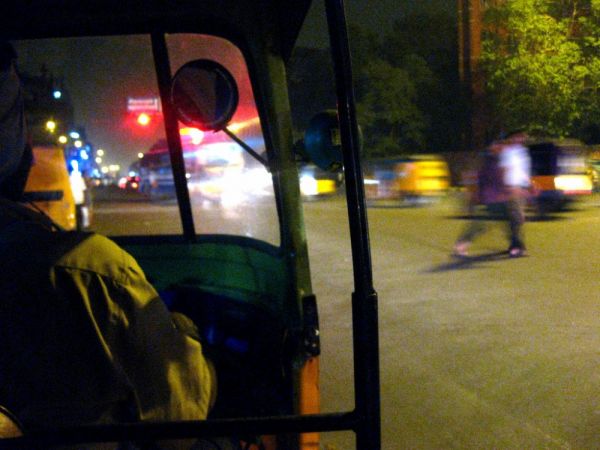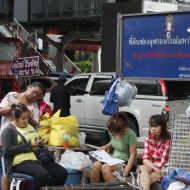From Tea Vendors to Grocers, All-Night Office Shifts Spawn a Nocturnal Economy

Office employees and informal workers in Chennai increasingly rely on each other throughout the night. Photo credit: acme via Flickr Creative Commons
It is well past midnight – the beginning of the work day for Periyasamy. His moped, weighted down with a large container of milk and hot water for making tea, is parked on the side of the road. “Not many office-goers, especially those working in the night shifts, have the office food courts open at this time,” he says, which makes his caffeinated product an in-demand item, and scarce to boot.
In the not-too-distant past, one typically spotted late-night street vendors like Periyasamy in railway stations, bus terminals and airports. They used to serve mainly the transporters, who transfer goods from one part of the city to another, as well as people traveling late at night from Chennai to Puducherry or other districts. Garbage collectors, road cleaners and cab drivers rounded out their customer base. But like many Indian cities, Chennai has become a place where night shifts are no longer only for the blue-collar class. Overnight hours have become the norm, thanks to the many multinational corporations (MNCs) that must sync their clocks to time zones on the other side of the world.
As such, the needs of bleary-eyed night-shift cubicle drones have fueled a shadow sector to support them: the dusk-till-dawn informal service economy. From the busy L.B. Road in Adyar to the IT corridor on Rajiv Gandhi Salai, street vendors now begin to emerge around 9 p.m., and grocery shops extend their hours long past traditional closing times.
Periyasamy has been in this business for eight months and earns Rs8,000 to Rs10,000 ($150 to $187 USD) monthly. Prior to working as a street vendor, he was a daytime security guard and earning about Rs11,000 per month. Knowing that his new job as a vendor might mean a reduction in income, Periyasamy made the change anyway. His newly flexible schedule allows him to spend more time with his family while working at night. “I have two daughters studying in school. While my wife takes care of the household chores, I drop the children at school, bring them back and help in other outdoor works during the day,” he says.

With multinational corporations syncing their clocks to the other side of the world, night shifts are becoming more common. Photo credit: Ishan Manjrekar via Flickr Creative Commons
A vendor named Senthil says he was also lured into late-night vending a couple of months ago when he noticed the rising number of people traveling through the city in the wee hours. “I leave my house by around 8:30 p.m. I usually stand near Madhya Kailash, as it is the point from which most state buses, heavy vehicles and airport cabs travel to their respective destinations,” he says. During the day, he notes, people have scores of shops to choose from, but at night there’s less competition. “I make close to Rs300 to Rs400 ($5.50 to $7.50 USD) each day. On busy days … the sale is higher.”
Mobility is these vendors’ biggest advantage. Following the nightly rush like birds migrating with the seasons, they can maximize their profits in a compressed amount of time. “We do not have a regular joint,” says Periyasamy. “We might begin from one point every day, but we prefer to keep moving around the city to add to our sales.”
And for exhausted office workers, the vendors are a godsend. “You cannot sit in the office for ten hours at a stretch,” says Praveen Kumar, who works from 4 p.m. to 2 a.m. at a multinational corporation. “I and my group of colleagues come out post-12 to have a cup of coffee to refresh ourselves as well as give ourselves a kick to work the rest of the night.”
Little did Praveen know that when he graduated college he would land himself a night-shift job. Though he had seen a few friends take night jobs, mostly at call centers, he assumed he would follow a more traditional path. But today, nine-to-five can no longer be called the traditional path for India’s professional class. “Earlier, the night-shift culture was popular mostly in the BPOs [business process outsourcing],” he says. “But now, as more companies expand their business abroad, their work timings cater to the offices abroad. We have two teams — one working for North America and the other for South America. Hence, my timings have to be according to the timings of the offices based there.”
Periyasamy and Praveen represent the symbiosis of Chennai’s two nocturnal classes and reflect the shifting trends in the city’s work-life norms. While Periyasamy’s entire family of four resides in a 500-square-foot room, Praveen stays in a three-bedroom rental with his parents, his wife and his sisters. (In India, living communally with one’s family is common).
Working nights does hold some advantages, Praveen feels. “While you get paid extra for working the night shifts, you also avoid the usual traffic chaos that one faces working from nine to five.”
The city’s nighttime economy has also added to the sales of small businesses. Many grocery shops or small department stores that used to shut down by 9 p.m. now keep their doors open till midnight.
“I have many working men and women coming to my shop to buy their regular stuff, especially milk,” says J Kumar, who runs a small grocery store in Perungudi, where most of the IT companies are located. “Most of them have unearthly work hours. Some of them had requested if I could keep extending the timing of the shop by an hour or so – it would benefit them as well as me in my business. I decided to keep it open.”
Ruminating on the need to adapt to a fast-changing urban world, Kumar says, “From time to time, we have to change according to our surroundings. Gone are the days when there existed just a single shift: 9 a.m. to 5 p.m. Nowadays, people have become aggressive toward their work, and hence, evening shifts and night shifts have come into being.”
These changes will likely only accelerate. Many of India’s MNCs are growing significantly more profitable than domestically based companies, which will mean more expansion, more workers – and more night shifts. For his part, a security guard at the RMZ Business Millenia Park who I spoke to is just happy to see that he’s not the only one slogging through till sunup.









